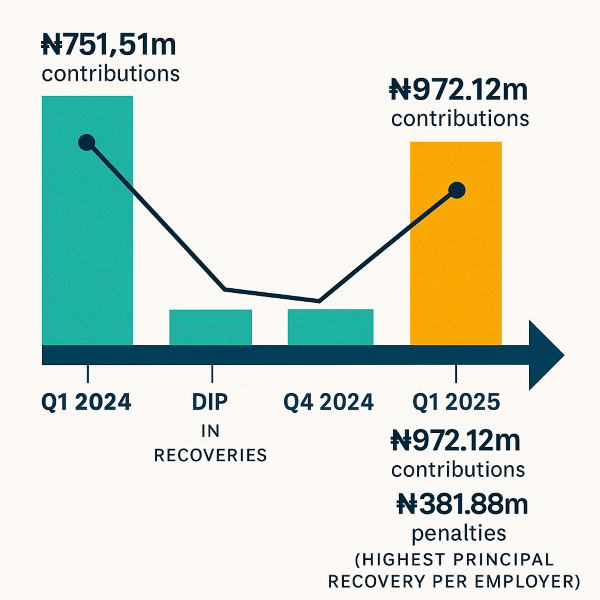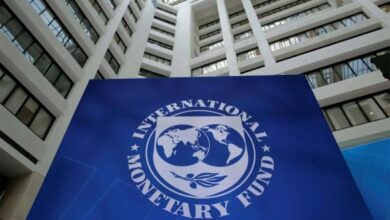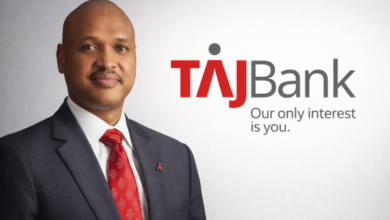PenCom Tightens the Net on Defaulting Employers, Recovers ₦4.57bn Pension Contribution

Nigeria’s pension regulator has fired another strong warning shot at erring employers. Between the first quarter of 2024 and the first quarter of 2025, the National Pension Commission (PenCom), through its enforcement arm, recovered a total of ₦4.57 billion in unremitted pension contributions and penalties from defaulting organisations.
The breakdown, disclosed by Oguche Agudah, Chief Executive Officer of the Pension Fund Operators Association of Nigeria (PenOp), shows that ₦2.12 billion was recovered as outstanding pension contributions, while an additional ₦2.45 billion came in as penalties.
How the Recoveries Were Made
PenCom’s enforcement covered 138 defaulting employers during the five-quarter period. The data shows:
- Q1 2024: Highest haul – ₦751.51m contributions + ₦1.44bn penalties.
- Mid-2024: Dip in recoveries as monitoring mechanisms were being refined.
- Q4 2024: Rebound with intensified enforcement actions.
- Q1 2025: ₦972.12m contributions + ₦381.88m penalties from 19 employers, averaging ₦71m per employer—the strongest principal recovery per case within the review period.
The trend points to fewer defaulting employers, but with larger, more material cases being addressed—an indication of improved systemic monitoring.

Why This Matters
Nigeria’s Contributory Pension Scheme (CPS), established under the Pension Reform Act, is a cornerstone of social protection and capital market growth. Yet, compliance gaps persist.
Key Implications:
- Worker Protection: Pension recoveries safeguard employees’ future, ensuring retirement savings are intact.
- Corporate Governance: Enforcement pressures firms to comply, strengthening transparency and accountability.
- Financial Markets Impact: Pension funds represent long-term investible capital that drives infrastructure financing, debt markets, and equity investments.
- Regulatory Credibility: Sustained enforcement signals that PenCom is not just reactive but proactive in protecting contributors.
Agudah emphasised that episodic crackdowns must evolve into systemic prevention through:
- Real-time remittance monitoring.
- Stiffer sanctions for chronic defaulters.
- Employer education to curb repeat offences.
What Employers Must Know
By law, any employer with three or more staff must remit pensions into Retirement Savings Accounts (RSAs) monthly. Non-compliance exposes employers to:
- Regulatory sanctions and penalties.
- Potential reputational damage.
- Litigation risks from employees.
Workers are also empowered to use whistle-blowing channels if their pensions are not being remitted.
The Bigger Picture: From Recovery to Prevention
The Nigerian pension industry, with over ₦18 trillion in Assets Under Management (AUM), is one of Africa’s largest institutional capital pools. Sustained leakages through non-remittance risk undermining confidence in the scheme.
To strengthen sustainability, the focus must shift from big recovery headlines to durable compliance systems. That means digitised tracking, cross-agency collaboration (tax, labour, and corporate regulators), and continuous engagement with employers.
BRANDECONOMY Takeaway
The recovery of ₦4.57bn in five quarters is both a victory and a warning. It shows PenCom is tightening its enforcement net, but it also reveals the persistence of weak compliance culture among some employers.
For Nigeria’s pension future, the goal must be clear:
- Fewer defaults.
- Faster remittances.
- Stronger, predictable retirement outcomes.
In the end, pension compliance is not just about enforcement—it is about trust. And trust is the bedrock of both retirement security and the stability of Nigeria’s financial system.












